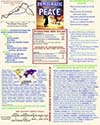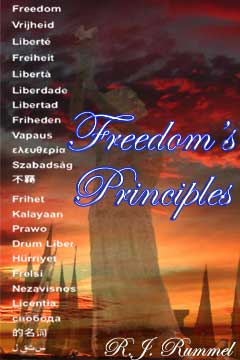
I want to compare the democratic peace foreign policies of Presidents G.W. Bush and Bill Clinton to that of President Obama, which is uniquely his. I am not interested in particular policies or actions, but rather in specifying the paradigm underlying these policies, its operating procedures, and its world view.
In the last two centuries, Europe and the United States have gone through three foreign policy paradigms. Each was a measured way to keep the peace and deal with crises and threats to the major Powers that could lead to war. After the Napoleonic Wars ended in 1815, European Powers met in numerous conferences and congresses, in addition to consulting with each other, to first establish a new status quo, and subsequently to settle their issues (colonialism, freedom of the seas, navigation, new inventions, and the balance of world power). This is the jaw-jaw diplomacy paradigm. Possible antagonists should talk to each other to settle their differences. Thus, they had conferences on sanitary matters, statistics, maritime issues, free navigation of the Scheld, weights and measures, marine signaling, monetary questions, telegraphic signaling, metric system, railroad transportation, the slave trade, and so on.
When World War I bloodied Europe and reached into remote corners of the world, with nine thousand combat dead, it destroyed any intellectual pretentions that the meeting and talking paradigm led to a stable peace. In the global wreckage, even before the war was over, a new paradigm emerged. Irregular diplomatic gatherings were not enough. There must be a permanent international organization involving all nations and meeting regularly to deal with international issues and conflicts, help settle them, and above all, prevent violence -- a League of Nations. Also, it seemed, international law must be refined and developed further to establish the universal rules of international relations and the use and morality of power. Major Powers must pursue disarmament through all means. And diplomacy has to be structured and directed through international organizations and in accord with international law. The goal was a lasting peace.
So, after the war the victors, excepting the U.S., formed the League of Nations. They paid much attention to formulating the international law of war and peace, and creating functional international organizations to meet general international needs. Disarmament conferences met and established the proper or proportional arms permitted the major powers. All this was just the right process to achieve permanent peace, or peace in our time. That intellectual illusion – the political idealist paradigm of international organizations, law, and disarmament -- was blown apart by the bombs and 15 million combat dead of World War II.
Then a new paradigm emerged, a rigorous and systematic version of what has existed throughout the history of relationships between independent groups, whether tribes, city-states, or nation-states. This was the emphasis on power as the moderator of these relations, and on the balance of power as the critical instrument for diplomacy to work with. To see how old this idea is, read Thucydides' History of The Peloponnesian War (perhaps published shortly after 411 B.C.). But after World War II the old idea of power and its balancing was refurbished and systematized in a paradigm called political realism. The primary source of this was the writings of Hans Morgenthau on international relations theory.
His book Politics Among Nations in 1948 was a revelation to many and a basic textbook among diplomats and students (it was mine). It was a paradigm change. Morgenthau claimed that objective laws govern international politics. At the heart, a nation’s interests are defined by power. The realistic diplomat must think in terms of power—of other nations alone or in combination, and how such power affects one’s own nation. With that in view, power must be balanced and diplomacy is the way to do so and to keep the peace. This is now the major paradigm of the American foreign policy establishment, but not necessarily Barack Obama’s.
How then does the democratic peace fit in? It is an opposing paradigm, seen as a return to idealism by the realists and in conflict with their view of foreign policy. More on this in Part IV.















No democratic wars? Was not Hamas democratically elected? Among many others.
ReplyDeleteSure, the kind of regime that makes war on other democracies tends to murder its opponents, but it still gained power democratically.
If you define a democratic regime as the kind of regime that is reluctant to use violence against its subjects, then such regimes are also reluctant to use violence against outsiders, but by and large, voters frequently prefer the the kind of regime that is enthusiastic about using violence.
A few years after Britain was setting up the League of Nations, it was at war with Irish democrats in the Irish War of Independence. Britain was clearly not very enthusiastic about the democratic peace then; it was autocratic towards its Irish Catholic citizens. Don't you think the Irish War of Independence counts as a war between two democracies? I know that Ireland wasn't a country yet, but the people on the Irish side believed in democracy and they established a democracy once Ireland was independent.
ReplyDeleteNo student of the democratic peace or of war to my knowledge accepts that the Irish War Of Independence 1919-1921 was between democracies. It was not an international war, but a civil war involving guerrilla attacks by the Irish Republican Army. Ireland was not an independent and sovereign nation, but under British rule. The idea of a democratic peace only applies to independent nations, or defacto sovereign groups, such as tribes, city states, terrorist groups that control a territory and population.
ReplyDeleteWhy doesn't the IRA count as a "terrorist group that controls a territory or population"? I imagine that its territory kept changing, but the Gaeltacht areas must've stayed IRA throughout.
ReplyDeleteJust by coincidence, there was an article on page 9 of the Sunday Times (a British paper) today called "Dublin planned to blow up BBC studios in Ulster". (This is not on the website yet, but probably will be in a few days' time) A newly-released memo says that the Republic of Ireland devised an Exercise Armageddon in 1969, which planned to distract the British army to BBC studios and invade the Catholic areas of Derry and Newry in the process. More worringly for your theory, it seems as if this Exercise was devised after a full-scale invasion of Northern Ireland had been considered by democratic Ireland and then rejected as unworkable.
Yes, I know, this war and invasion never happened, but it's still one democracy planning for war with another democracy. Is there a full analysis of Anglo-Irish relations on your website somewhere? Or perhaps somebody else's?
Hello again. I've found the article online. It has a different title on the website for some reason. http://www.timesonline.co.uk/tol/news/world/ireland/article6814997.ece
ReplyDeleteThe IRA did not publicly act as an agent of the democratic Irish government, and itself was non democratic. No elections in the IRA were held for its "legislative body" and officers. Therefore, its violence or war against Britain was not an exception to the democratic peace.
ReplyDeleteI feel this is becoming a "No True Scotsman" type argument. The Dail approved of the IRA campaign and accepted responsibility for IRA actions in April 1921. It's true that some members of the Dail disapproved of IRA violence, but that just proves that the Irish side respected diversity of opinion. I am unaware of any serious disagreement between the Dail and the IRA. As far as I know, they worked together throughout the war. There may well have been a few occasions when the IRA went beyond the wishes of the Dail, but I would call that a flaw within the democracy rather than a mark of an autocracy.
ReplyDeleteApplying consistent standards, you can't say that occasional military actions taken without approval from Parliament stops a country from being a democracy. If you were to be so strict, then Britain's disgraceful Diego Garcia incident in the 1970s would instantly disqualify it as a democracy (at least during that period). Britain's Parliament wasn't even told what the military was doing then!
I have had to do some study of the history of Ireland if order to understand how the War of Independence fits into the Democratic Peace (DP). Most important is whether Ireland was independent and sovereign during that war. This is required for a case to be an exception to the DP. As best I can determine, the Irish Free State (Ireland) and the war it supported by the IRA was not sovereign and independent until 1937. From 1922 to 1937, The British king remained king in Ireland. The British Government, primarily until the passing of the Statute of Westminster in 1931 continued to have a significant role in Irish governance. The Irish Free State, like all Dominions, had limited autonomy compared to the United Kingdom. The IRA War of Independence 1916-1921 was not a war between democracies, since Ireland (the Irish Free State) was not sovereign and independent at the time.
ReplyDeleteI recognize that this may be controversial for some, but look at it this way. It is such an odd case, and one has to stretch to make it an exception, that is shows the power of DP. There is no clear case of war between democracies (as would be that between democratic Norway and democratic Sweden, for example), and to find one means looking for odd ball cases that are unclear controversial.